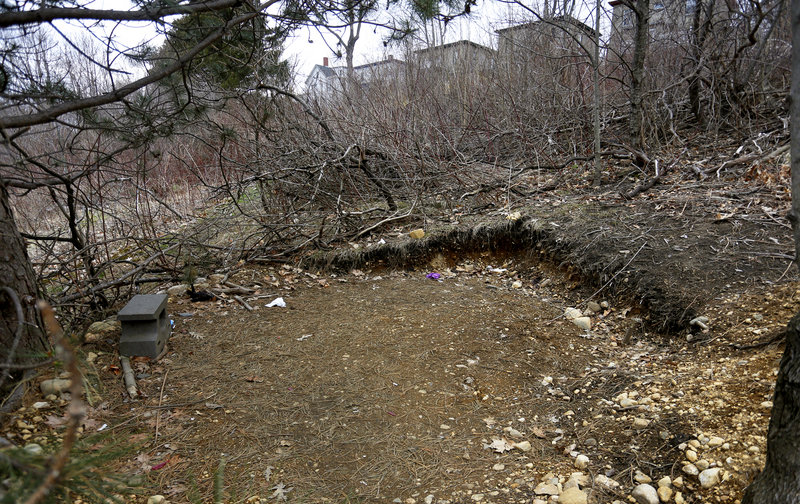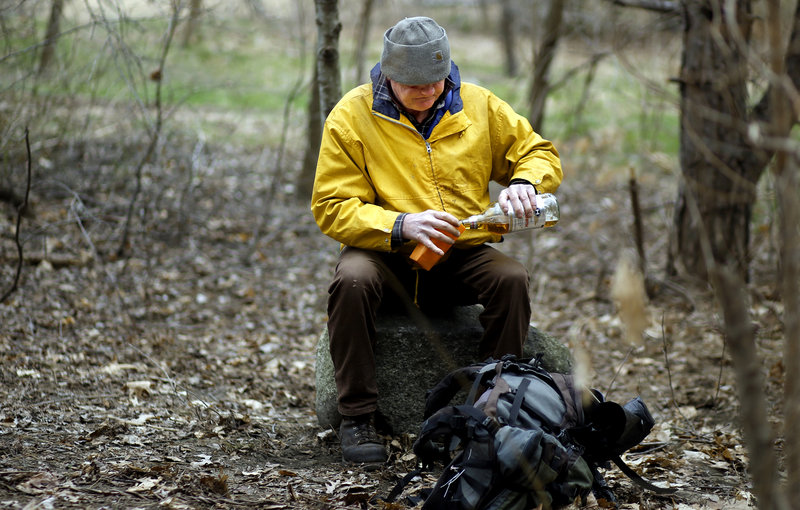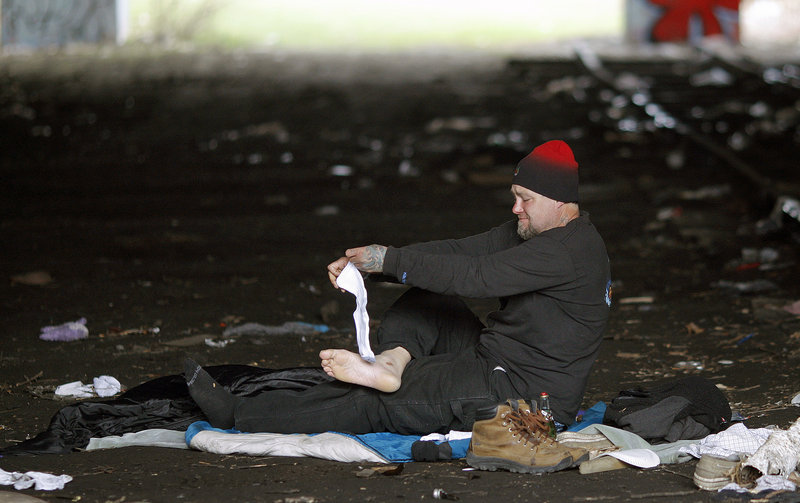When Brian Barbour perished in a tent fire in the woods off West Commercial Street earlier this month, some among the city’s West End homeless population held a ceremony to mark his passing.
But there already was another ritual under way. The railroad police were stepping up efforts to clear out the homeless encampment that had grown up between West Commercial Street and the Fore River.
Some who had camped among the network of rough trails a short walk from the waterfront already had moved their gear. Others were issued no-trespassing orders in the days after the fire, or — if they had already been warned — a court summons.
The crackdown led people to other parts of town, wooded spots off outer Congress Street, the promenades at either end of the peninsula or behind Evergreen Cemetery. Tents sprang up alongside part of the Portland trails network.
Russ Arbo, who has spent time camping outside but right now sleeps on a friend’s couch, said the short-term impact is that people move farther away from the downtown.
“They’ll move more to the outskirts of town where people won’t see the suffering so they won’t pay as much attention to them,” Arbo said.
Advocates, landowners and homeless people themselves say the number of people camping has grown dramatically in the past few years, and with good weather arriving the number is expected to rebound after dropping off during the winter months.
And now, with Portland officials handing out notices requiring people who use the city’s homeless shelters to get housing counseling, that number may grow faster.
“Now there are no beds,” said Peggy Lynch, an outreach worker with Preble Street, the nonprofit group that helps the poor in the city. “There are people who seek shelter who can’t get that shelter anymore.”
CAMPING ADVANTAGES
For those with nowhere else to stay, camping has advantages over the city shelters. There is independence, nobody saying when to go to bed, when to wake up and when to shower.
A campsite doesn’t care whether someone has been drinking or engaged in behavior, criminal or otherwise, that might bar him from the shelter.
Couples can stay together in a tent but are separated at the city shelters.
People with dogs typically can’t bring them into the shelter.
For Russ Lamb, it’s a matter of security.
Lamb avoids shelters — or as he calls them, “the mission” — because he said his possessions are too valuable to him. He points to the radio and MP3 player he is charging at the city’s public library and says he has a CD player in his backpack.
Lamb, sporting a long gray moustache and a backpack with a protruding fishing pole, said last week he had just arrived in Portland. He travels across the country, never staying long in one place. When he camps, he camps alone. He doesn’t want other people’s behavior — particularly if it draws police — to reflect on him.
Lamb expects that the land off West Commercial Street will get cleared out — though lots of trash will be left behind, further irritating the landowners. Then people will gradually return to the large swath of woods — close to downtown services and people, but remote enough that they are usually left alone.
They will return in ones and twos, after dark, and when they don’t get rousted, others will follow, he said.
Homeless camps often don’t look like such. Sometimes there are one- or two-person dome tents, with a cinderblock or 5-gallon joint compound bucket serving as a stool. In other cases, there is simply a plastic tarp draped over a line, some clothing or linens scattered in the vicinity.
Not far away, there is typically a cluster of used toilet tissue marking where residents relieve themselves. Some work hard to avoid detection, carrying their belongings, including shelter, and carrying out their trash. In some areas, charred sticks show where a small fire burned. One of the sites near the railroad land shows where a fire got out of control and burned a nearby birch tree.
One of the problems with living outside is safety.
Arbo said Barbour’s death resonated with him. One winter when he first arrived in Portland several years ago, he and his girlfriend slept in an abandoned apartment building. At night, in the bitter cold, they huddled in a closet, hoarding the miniscule heat given off by a candle.
Another winter, they slept in a tent to the side of the railroad tracks. Once it snowed, the tent was hidden from view and the layer of snow served as an insulator, making it tolerable inside.
“Nobody chooses to die alone in a tent in the cold,” Arbo said. “I just don’t see how people get forgotten.”
Portland firefighters recently distributed battery-operated lamps, encouraging those who live outside to use them instead of open flames for light. They also distributed safety tips for outdoor fires.
At least the risk of fire drops as the temperatures go up at this time of year.
Sometimes, a camp will grow in numbers because homeless people gravitate to a good spot. But it also provides a measure of security.
“When somebody in the homeless community gets assaulted, they’re either outnumbered or it’s one person alone, there’s no watching eyes,” Lynch said. “Even in the outskirts (of the city), people tend to group together.”
People tend to gravitate to people with similar issues, she said. Those who wrestle with substance abuse might opt for people with the same affliction.
“People who may have mental health issues and not be substance abusers, they tend to understand each other,” Lynch said.
There’s a measure of support having people nearby.
“When I was camping out, it was a community,” said Amanda Wagner, who now has a place to stay. “When it came to like food or problems with your tent, people would help out.”
Josh O’Brien, who runs Portland’s Oxford Street Shelter, said that after Barbour’s death, many people who have historically declined city help did make contact with counselors.
“To be homeless in Portland or anywhere is to be pretty vulnerable in their everyday life,” he said. “That vulnerability is enhanced when something like that happens.”
FEWER OPTIONS
Clients report that places where people can camp in the city without drawing attention are becoming harder to find.
The railroad land was desirable. It was close to downtown, where the homeless can visit soup kitchens, the day shelter at Preble Street or the Public Library. For some, it was near work on the waterfront. There were no neighbors to speak of, though encountering the railroad police could lead to a no-trespass order.
The railroad police did not respond to a request for an interview.
Some camps are out past Morrill’s Corner or near the river on Riverside Street.
Jaime Parker, trail manager for Portland Trails, said he sees twice as many tents as he did in recent years, and that has led to complaints from users of the trails.
“We’re having some more problems as far as litter, debris and substance abuse,” he said. “Sometimes people kind of fear for their safety, if they’re out with their kids or a woman jogging alone.”
“If somebody’s leaving a tremendous amount of trash around, or like harassing everybody, or causing any problems, we’ll take whatever action we need to as a landowner. We’re not actively chasing people out of the woods,” Parker said. “We generally have a live and let live attitude. … We also feel for people’s plights out there.”
Portland Police Chief Michael Sauschuck said police try to get people who are camping out connected with city outreach workers, and they also enforce criminal trespass orders.
“The goal is to really work with them to get them the assistance they need and get them plugged in with proper services,” he said. “We can’t make them do that. At end of day, the last thing we want to see is people out sleeping in the woods.”
On a recent afternoon in the area beneath the Casco Bay Bridge, one man huddled under a sleeping bag, his hiking boots and a beer parked next to him. He woke, but declined to be interviewed and after changing into clean socks and pulling on his shoes, he disappeared down a trail.
Another man wearing a large backpack spotted a reporter and photographer, turned around and was gone.
Often, people who live outside don’t want to draw attention, for a myriad of reasons.
“There is a feeling of being shunned,” Arbo said, referring to the shame some people feel at not having their own place. “Whether you’re homeless or not, you have some degree of honor, some degree of pride.”
Lynch says she knows several homeless people who fill out job applications regularly but get no offers. They worry that employers may have seen them around Portland and judged them unfit for work because they are homeless.
Lynch knew Barbour, even though he didn’t want services.
“Brian was a really nice gentleman. He worked at a few of the waterfront businesses. He was on a couple fishing boats out of Gloucester,” Lynch said. “He was a very, very nice man. I was really saddened to hear of his death out there.”
Barbour’s death gets a lot of attention because of the fire, but in reality, people in the homeless community are dying all the time, Lynch said. She knows of two who died after a brief hospitalization last week.
“They all know they’re vulnerable. Sometimes it can spark initiative for folks. Sometimes it sparks more hopelessness,” Lynch said. “It’s hard to say what inspires someone to actually let us help them. (But it) is a privilege for us when somebody allows us to help them get to a better place.”
Staff Writer David Hench can be contacted at 791-6327 or at:
dhench@mainetoday.com
Send questions/comments to the editors.





Success. Please wait for the page to reload. If the page does not reload within 5 seconds, please refresh the page.
Enter your email and password to access comments.
Hi, to comment on stories you must . This profile is in addition to your subscription and website login.
Already have a commenting profile? .
Invalid username/password.
Please check your email to confirm and complete your registration.
Only subscribers are eligible to post comments. Please subscribe or login first for digital access. Here’s why.
Use the form below to reset your password. When you've submitted your account email, we will send an email with a reset code.